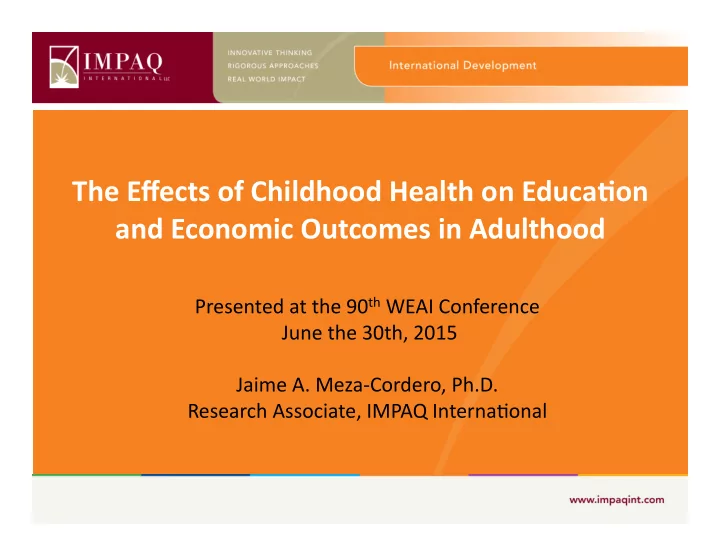

The Effects of Childhood Health on Educa4on and Economic Outcomes in Adulthood Presented at the 90 th WEAI Conference June the 30th, 2015 Jaime A. Meza‐Cordero, Ph.D. Research Associate, IMPAQ InternaEonal
IntroducEon • EducaEon compleEon levels and economic outcomes are hard to predict at early stages in life as there are numerous and cumulaEve determinants that are given and acquired throughout the life cycle. • This research focus on assessing exisEng correlaEons between health and nutriEon in early life with educaEonal/economic outcomes in adulthood for the case of Costa Rica.
Outline • Research QuesEon and Hypothesis • ObjecEves • ExisEng Literature • Data: Costa Rican Longevity and Healthy Aging Study (CRELES) • Empirical Strategy • Findings • Conclusions and Policy ImplicaEons • Future Research
Research QuesEon and Hypothesis • Research QuesEon: Are health and nutriEon in early life somehow associated with educaEonal/economic success in adulthood? • Hypothesis: Health and nutriEon during childhood plays a fundamental role in the accumulaEon of human capital, allowing healthier children to learn more and be more producEve as adults.
ObjecEves • ObjecEve 1: Assess the associaEon between early life health and early life nutriEon with educaEon outcomes in adulthood. • ObjecEve 2: Assess the associaEon between early life health and early life nutriEon with economic outcomes in adulthood.
ExisEng Literature • Be\er health facilitates individuals to improve their SES (Strauss and Thomas, 1998). • However, low SES leads to late detecEon of health condiEons, affecEng the capacity to work and leading to lower savings (Adams, Hurd, McFadden, Merril, Ribeiro, 2004).
ExisEng Literature • Maluccio et al. (2009) analyzed the effects of childhood nutriEon on educaEonal outcomes, finding that treated female children increase their school compleEon. • Smith, Shen, Strauss, Zhe and Zhao’s (2012) explored the effects of childhood health on socioeconomic status using data from the China Health and ReErement Longitudinal Study. Their main findings are that good health as a child is associated with an increase in per‐capita expenses, and adult height is strongly related to years of schooling completed.
Data • The data for this study comes from the first wave of CRELES, a longitudinal study of 2827 adults born in 1945 or before (ages 60 and over during the first interview) with oversampling of the older. • The survey collected informaEon on early age and current health, cogniEve funcEoning tests and socioeconomic outcomes.
Summary StaEsEcs
Empirical Strategy • The explanatory variables are self‐reported childhood health and height to the knee , as they represent early life health and nutriEon proxies respecEvely. • The dependent variables are years of educa4on completed and log income .
Findings: EducaEon CompleEon Column (1) includes age cohort and foreign born dummies. Column (2) includes age cohort, foreign born and district of birth dummies.
Findings: Log Income Column (1) includes age cohort and foreign born dummies. Column (2) includes age cohort, foreign born and district of birth dummies.
Conclusions • The results suggest that childhood health is highly associated with educaEon/economic outcomes, for both men and women in Costa Rica. • As it has been presented in the literature, healthier kids are most likely to achieve higher educaEon compleEon, especially females. Also consistent with the exisEng literature, be\er nutriEon seems to lead males to higher paying occupaEons.
Policy ImplicaEons • A policy implicaEon derived from this study is that governments should pay primordial a\enEon to the health care of children, as this will have significant repercussions in their human capital accumulaEon. • Another policy implicaEon is that governments must Emely share informaEon about infant nutriEon with families, as this will have affect their future producEvity/income.
Future Research • Upcoming studies can make use of very important informaEon contained in the biomarkers secEon of CRELES, such as cholesterol and corEsol. • Further research also has the potenEal to analyze causal pathways that would help explain how early life health can affect other determinants such as adult health and lifestyle behaviors.
Recommend
More recommend